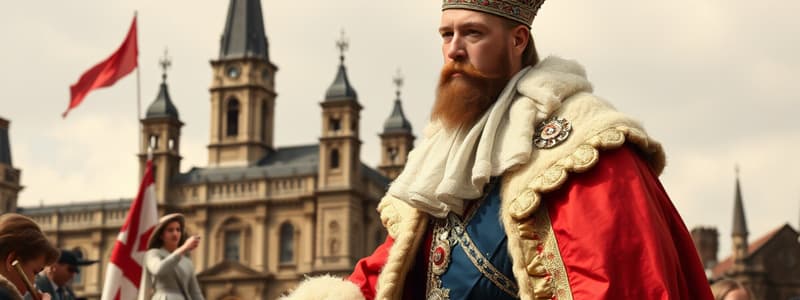Podcast
Questions and Answers
What concept did Montesquieu introduce to prevent concentration of power?
What concept did Montesquieu introduce to prevent concentration of power?
- Separation of powers (correct)
- Government by consent
- Checks and balances
- Natural rights
Which idea is associated with John Locke's philosophy?
Which idea is associated with John Locke's philosophy?
- Separation of church and state
- Natural rights (correct)
- Social contract theory
- Divine right of kings
What did the Founding Fathers design to avoid the risks of absolutism?
What did the Founding Fathers design to avoid the risks of absolutism?
- A single-ruler system
- Direct democracy
- Parliamentary system
- Checks and balances (correct)
What was Voltaire known for advocating?
What was Voltaire known for advocating?
How did Locke influence the U.S. government documents?
How did Locke influence the U.S. government documents?
Which branch of government corresponds with Montesquieu's philosophy?
Which branch of government corresponds with Montesquieu's philosophy?
Which aspect of governance did Locke believe should be based on consent?
Which aspect of governance did Locke believe should be based on consent?
What is one of the main ideals promoted by the Enlightenment thinkers?
What is one of the main ideals promoted by the Enlightenment thinkers?
In what way did the Founding Fathers ensure no branch of government became too powerful?
In what way did the Founding Fathers ensure no branch of government became too powerful?
What type of government did Enlightenment thinkers like Voltaire criticize?
What type of government did Enlightenment thinkers like Voltaire criticize?
What defines Absolutism as a political system?
What defines Absolutism as a political system?
Which historical document first limited the power of the English king?
Which historical document first limited the power of the English king?
What was Thomas Hobbes' belief regarding governance?
What was Thomas Hobbes' belief regarding governance?
Which event marked the overthrow of King James II and established a constitutional monarchy in England?
Which event marked the overthrow of King James II and established a constitutional monarchy in England?
What characterized the system of governance in a constitutional monarchy?
What characterized the system of governance in a constitutional monarchy?
Which of the following best describes the Enlightenment?
Which of the following best describes the Enlightenment?
What was a major impact of the English Monarchy's history on American governance?
What was a major impact of the English Monarchy's history on American governance?
What was a key feature of Absolutism that distinguishes it from constitutional forms of government?
What was a key feature of Absolutism that distinguishes it from constitutional forms of government?
The English Civil War ultimately illustrated the conflict between which two entities?
The English Civil War ultimately illustrated the conflict between which two entities?
Which statement describes the rights of citizens under Absolutism?
Which statement describes the rights of citizens under Absolutism?
Flashcards
Absolutism
Absolutism
A political system where a single ruler holds unlimited power.
Divine Right of Kings
Divine Right of Kings
Belief monarchs derive authority directly from God, thus justifying their absolute rule.
Thomas Hobbes
Thomas Hobbes
Philosopher who argued humans are selfish; believed absolutism was needed to avoid chaos.
Magna Carta
Magna Carta
Signup and view all the flashcards
English Civil War
English Civil War
Signup and view all the flashcards
Glorious Revolution
Glorious Revolution
Signup and view all the flashcards
The Enlightenment
The Enlightenment
Signup and view all the flashcards
John Locke
John Locke
Signup and view all the flashcards
Montesquieu
Montesquieu
Signup and view all the flashcards
Voltaire
Voltaire
Signup and view all the flashcards
Study Notes
Absolutism
- A political system where monarchs wield total authority over the government and populace.
- Monarchs often assert their power as divinely granted, known as the Divine Right of Kings.
- Key features include unrestricted control over laws, taxes, military, and religion without checks and balances.
Thomas Hobbes’ View
- Hobbes argued in "Leviathan" that humans are inherently selfish.
- He believed that without robust governance, society would devolve into chaos.
- Advocated for absolutism as the means to maintain order and avoid societal collapse.
The English Monarchy
- The English Monarchy encompassed royal families governing England, Scotland, Ireland, and at times, regions of France.
- Transitioned from an absolute monarchy to a constitutional monarchy, distributing power between the monarch and Parliament.
Key Historical Events
- Magna Carta (1215): The first document aimed at limiting royal power and establishing legal principles.
- English Civil War (1642-1651): Conflict between monarchy and Parliament, resulting in a temporary monarchy abolition.
- Glorious Revolution (1688): Overthrow of King James II led to an agreement for shared power with Parliament, forming a constitutional monarchy.
Impact on the United States
- The foundations of American governance were influenced by the English experience.
- Concepts of limiting rulers’ powers and the importance of representative government emerged from historical precedents.
The Enlightenment
- A cultural movement in the 17th and 18th centuries promoting reason and individual rights.
- Emphasized scientific reasoning over tradition, advocating for personal freedoms against monarchical authority.
Key Thinkers of the Enlightenment
- John Locke: Advocated for natural rights (life, liberty, property) that governments are obligated to protect. He posited the right of the people to revolt against failing governments.
- Montesquieu: Introduced the concept of separating governmental powers into branches to prevent the concentration of power.
- Voltaire: Championed freedom of speech, religious tolerance, and critiqued absolutism.
Impact on American Government
- Locke’s Influence: His ideas on natural rights and consensus governance significantly influenced the Declaration of Independence and the U.S. Constitution.
- Montesquieu’s Influence: The U.S. government embodies the separation of powers across executive, legislative, and judicial branches, reflecting Montesquieu's philosophy.
- Legacy of Absolutism: The Founding Fathers aimed to prevent the centralization of power by establishing a system of checks and balances.
Studying That Suits You
Use AI to generate personalized quizzes and flashcards to suit your learning preferences.




